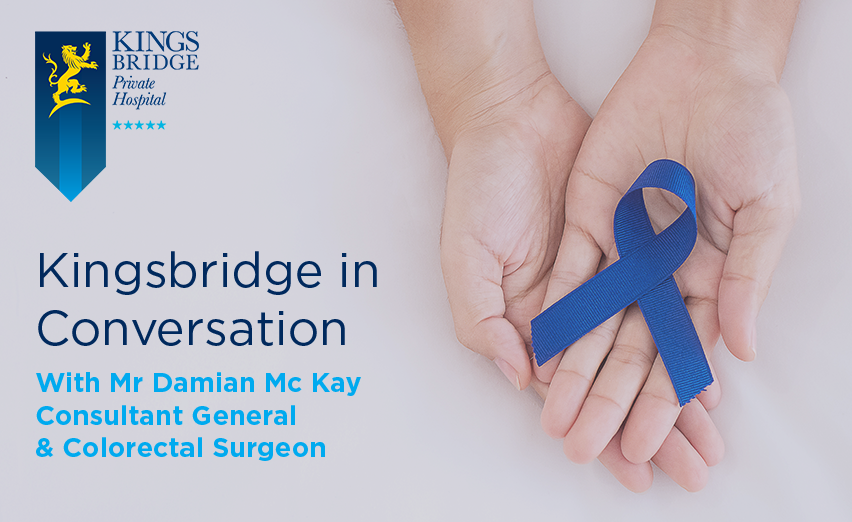Bowel Cancer Awareness Month - Conversation with Mr Damian McKay, Consultant General and Colorectal Surgeon
08th, Sep 2022

As April is Bowel Cancer Awareness Month we sat down with one of our resident Consultant General and Colorectal Surgeons, Mr Damian McKay, to talk about bowel cancer, the importance of diet on bowel health and what the future holds.
Hi Damian, could you tell us, firstly, what your areas of expertise are?
Colorectal Cancer is my main area of clinical interest. I chose this area of surgery to specialise in as I find it the most challenging part of General Surgery. The type of surgery can be complex and interesting. I enjoy using keyhole / laparoscopic surgery which allows us to work with small incisions and is minimally invasive to achieve excellent outcomes for patients. With bowel cancer, early diagnosis is key and fortunately many patients can be cured.
What interests you the most in your line of work?
Taking patients on the journey from assessing their symptoms to investigation and reassurance or where required surgery, and hopefully a successful recovery.
Are you seeing any changes in the way patients take care of their gut health over the years?
Social Media has certainly raised awareness of bowel cancer, inflammatory bowel disease and IBS. With this improved awareness, patients are more likely to seek help if they see changes in their gut health.
What are common signs one should look out for when worried about Bowel Cancer?
A number of common signs are:
- Change in bowel habits particularly to looser stools which persist for four weeks or more,
- Bleeding from the back passage,
- Blood mixed in with stool,
- Pain in the abdomen,
- Unexplained tiredness.
Are there any particular trends in terms of causes for bowel cancer or related diseases you’re seeing recently?
One of the more concerning trends is the number of younger people being diagnosed with bowel cancer. It is unclear why this trend is taking place.
What are the treatment options you provide for those who are diagnosed?
Most confirmed diagnoses are made at the time of a colonoscopy or CT Colonoscopy. Surgery is the mainstay of treatment and is often very successful. Unfortunately, in some advanced cases surgery is not an option. In these cases, patients may be treated with chemotherapy. There have been great advancements in the types of chemotherapy drugs used and in other techniques used to treat more advanced disease and many patients with advanced disease now live significantly longer than 10 or 20 years ago.
Are there any advancements being made in the detection or treatment of bowel cancer and related issues?
The greatest leap, in terms of detecting bowel cancer in patients with symptoms in the general population, is the use of FIT (Faecal Immunochemical Tests). These test for minute amounts of blood in the stool and will detect the vast majority of cancers in those tested. Getting GP’s access to the these tests and giving patients a clear pathway to them will bring better detection of cases hopefully at an earlier stage. A team of clinicians are working hard to lobby for the funding to ensure this is available soon for patients in Northern Ireland.
What advice would you give to those who are worried about Bowel cancer and other gut related health issues?
Make sure to maintain a healthy lifestyle and diet, minimise the amount of alcohol consumed and avoid smoking. Make yourself aware of any family history of the disease and if you have any of the typical persistent symptoms of bowel cancer you should seek medical attention.
How do you enjoy your free time outside of work, especially during lockdown?
Last year, due to Covid-19, the ability to carry out investigations for patients with suspected Bowel Cancer significantly reduced. I spent a lot of my free time working with the Northern Ireland Cancer Network, Laboratory services in the Northern Trust, colleagues in Public Health and the Health and Social Care Board to work to mitigate the effect of COVID. This work enabled us to use stool FIT tests to prioritise GP referrals and patients on existing waiting lists to help detect as many cancers as possible. Apart from that I’ve spent as much time outdoors as possible!
Thanks for taking the time to speak to us today, Damian. Bowel Cancer is the third most common cancer in NI and the second biggest cancer killer. But it is curable and very treatable if caught early on.
Mr Damian McKay is a consultant at Kingsbridge Private Hospital in both Belfast and Sligo where we offer services to help diagnose, monitor and treat bowel cancer symptoms. If you are worried about your bowel health, please do not hesitate to book a private appointment with an expert consultant today.
Get In Touch
Kingsbridge Private Hospital, Belfast
Call 028 9066 7878
Text BOOKNOW to 66777 (for our private GP)
Book an appointment online, via our Online Booking Portal
Visit kingsbridgeprivatehospital.com for further information
Kingsbridge Private Hospital, Sligo
Call 071 916 2649
Email sligoadmin@kingsbridgeprivatehospital.com
Visit kingsbridgeprivatehospital.ie for further information
Recent Articles

